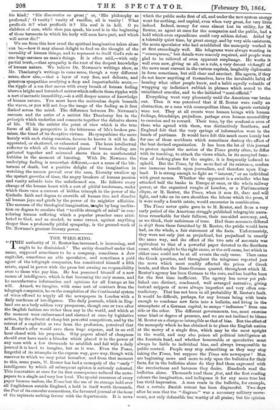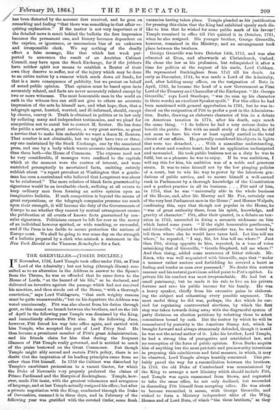THE WIRE-KING.
HE authority of M. Reuter has increased, is increasing, and
ought to be diminished." The entity described under that name, supposed sometimes to be a company, sometimes a Jew capitalist, sometimes an able speculator, and sometimes a paid agent of the telegraph companies, has constituted himself a fifth estate, equal in power with the press but owning no responsibility even to those who pay him. He has possessed himself of a new means of intelligence, which is fast becoming the only means, and he manufactures information and opinions for all Europe at his will. Armed, we imagine, with some sort of contract from the telegraph companies, he on the completion of the Continental system of wires offered to supply all the newspapers in London with a daily modicum of intelligence. The daily journals, which in Eng- land are as a body seldom very prosperous, though one or two after the English fashion are richer than any in the world, and which at the moment were embarrassed and alarmed at once by legislative action, by the advent of cheap but powerful competitors, and by the retreat of a capitalist or two from the profession, perceived that M. Reuter's offer would save them huge expense, and in an evil hour closed with his proposals. Why papers afraid of cheapness should ever have made a blunder which placed it in the power of any man with a few thousands to establish and fail with a daily journal it is hard to imagine, but so it was. Even the Times, forgetful of its triumphs in the express way, gave way, though with reserves to which we may point hereafter, and from that moment to this, some years, M. Reuter has had a monopoly of the " early " intelligence by which all subsequent opinion is seriously coloured. This innovation at once for its first consequence reduced the news- papers to a single and very low level. The special resources of every paper became useless, the Times lost the use of its strange hold over all Englishmen outside England, a hold in itself worth thousands, the Post of its consular connections, the favoured journal of the hour of the aspirants seeking favour with the departments. It is news which the public seeks first of all, and under the new system energy went for nothing, and capital, even when very great, for very little indeed. Indeed, money for once almost lost its utility, for M.
Reuter, as agent at once for the companies and the public, had a hold which even expenditure could very seldom defeat. Aided by a tolerably quiet time, by great energy, and by very able assistants, the acute speculator who had established the monopoly worked it at first exceedingly well. His telegrams were always wanting in "consequence," but details were scarcely required, and people were glad to be relieved of even apparent surplusage. He works it well even now, giving us all, as a rule, a very decent rgchauffe of the news most current in the various capitals, laughably diplomatic in form sometimes, but still clear and succinct. His agents, if they do not know anything of themselves, have the invaluable habit of hearing what other people knew, and a habit equally valuable of wrapping up indistinct rubbish in phrases which sound to the uninitiated oracular, and to the initiated "semi-official."
Everything went very pleasantly until the American war broke out. Then it was perceived that if M. Reuter were really an abstraction, or a man with cosmopolitan ideas, his agents certainly were not. They at all events were human beings with human feelings, friendships, prejudices, perhaps even human amenability to coercion and to reward. Their tone, by the confession even of those who agreed with them, was distinctively Southern, and England felt that the very springs of information were in the hands of partisans. It would have felt this much more keenly but for one of those accidents which sometimes destroy the effect of the best devised organization. It has been the lot of this journal to protest against the action of the Times pretty often, to differ with its teaching, to attack the views which, in its accepted func- tion of looking-glass for the empire, it is frequently induced to uphold. But the Times, by the mere fact of its existence, confers one immense benefit upon journalism, and therefore upon Eng- land. It is strong enough to fight an "interest," or an individual with great means. Whether the opponent is a swindler who has attacked half the banks in Europe at once, or the whole railway power, or the organized roughs of London, or a Parliamentary clique, or M. Renter, the Times, when it sees fit, dare and will fight, and take on its own shoulders the labour which the press, if it were really a fourth estate, would encounter in combination.
The Times never quite gave in to M. Reuter, and from a very early period of the American struggle published telegraphic narra- tives remarkable for their fullness, their one-aided accuracy, and, as we think, their unfairness of tone. Had these accounts differed in draft from those furnished by M. Reuter, the public would have had, on the whole, a fair statement of the facts. Unfortunately, they were not only just as prejudiced, but prejudiced in exactly the same way, and the effect of the two sets of accounts was equivalent to that of a powerful paper devoted to the Southern cause, which might be the right cause, or the evil cause, but which in either case could not be at all events the only cause. Then came the Greek question, and throughout the telegrams reported just the news which most readily affected the prices of Greek bonds, and then the Dano-German quarrel, throughout which M. Reuter's agency has been German to the core, and has besides been for the first time inefficient. The agency has never yet pub- lished one distinct, condensed, well arranged narrative, giving instead snippets of news always imperfect and very often con- tradictory. That has not been in all probability M. Reuter's fault. It would be difficult, perhaps, for any human being with brain enough to condense new facts into a bulletin, and living in the atmosphere of a German capital, to escape " influence " from one side or the other. The different governments, too, must exercise some kind or degree of pressure, and we are not inclined to blame M. Reuter on a charge so intangible as that of bias. But the effect of the monopoly which he has obtained is to place the English nation at the mercy of a single firm, which may be the most upright in the world, and may also poison all political intelligence at the fountain head, and whether honourable or speculative must always be liable to individual bias, and always irresponsible to public control. People may stop subscribing as they may stop taking the Times, but suppose the Times sole newspaper ! Men are beginning more and more to rely upon the bulletins for their facts, for in the bulletins alone do they find them expressed with the succinctness and bareness they desire. Hundreds read the bulletins alone. Thousands read them first, and the first reading colours the imagination, and indisposes it for any more true but less vivid impression. A man reads in the bulletin, for example, that a certain Danish retreat has been disgraceful. Two days after he sees that the "disgrace" was a necessary military move- ment, not only defensible but worthy of all praise; but his opinion
has been distorted by the account first received, and he goes on remarking and feeling "that there was something in that affair re-
quiring explanation." If the matter is not very important or if the detailed news is much behind the bulletin the first impression becomes the permanent one, and history becomes dependent on
the caprice, or ignorance, or unconscious bias of an unknown and irresponsible clerk. We say nothing of the deadly effect a false message, like that which last week pur- ported to announce the result of an Austrian Cabinet Council, may have upon the Stock Exchange, for if the jobbers have neither spirit nor means to establish a Reuter of their own they deserve to suffer, nor of the injury which may be done to an entire nation by a rumour which sends down all funds, for that is a mere consequence of publicity, but we protest on behalf of sound public opinion. That opinion must be based upon facts accurately related, and facts are never accurately related except by two or more witnesses. The most honourable man in the world on oath in the witness-box can still not give to others an accurate impression of the acts he himself saw, and what hope, then, that a telegraph agent, hurried, worried, and ill-informed, should, except by chance, convey it. Truth is obtained in politics or in law only by collating many and independent testimonies, and we plead for competition not to annul but to correct M. Reuter. He has done the public a service, a great service, a very great service, so great a service that to make him endurable we want a dozen M. Reuters. That number is not obtainable, but we might have two or three, say one maintained by the Stock Exchange, one by the associated press, and one by a body which wants accurate information more than them both—the House of Commons. The expense need not be very considerable, if messages were confined to the capitals which at the moment were the centres of interest, and were restricted peremptorily to ascertained facts, omitting entirely rubbish about "a report prevalent at Washington that a gentle- Jinn has seen a contraband who believed. that Longstreet was about to be reinforced." The mere relation of blank facts guaranteed by signatures would be an invaluable check, sufficing at all events to keep ordinary men from forming an active opinion upon an imaginative bulletin. If such competition is beyond the means of great corporations, or the telegraph companies presume too much upon their strength, it will become the duty of the Governments of Europe to see whether they cannot by mutual arrangement ensure the publication at all events of known facts guaranteed by con- sular signatures. Politicians cannot be left for ever at the mercy of an individual however spirited, or wide reaching, or successful, and if the Press is too feeble to secure protection the nations of Europe must. We shall be going to war some day on the strength of a bulletin prepared by a clerk who mistook a statement in the .New York Herald or the Viennese_Botschafter for a fact.































 Previous page
Previous page